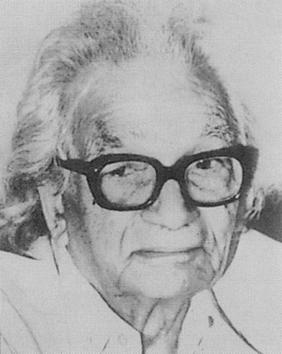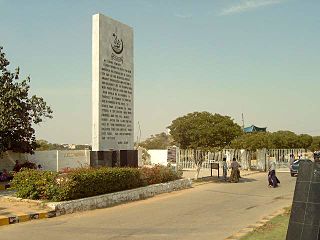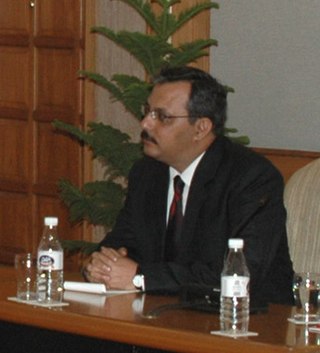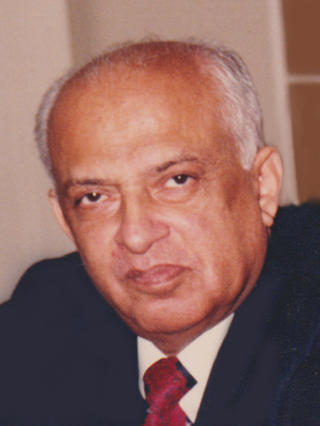Related Research Articles

The University of Karachi is a public research university located in Karachi, Sindh, Pakistan. Established in June 1951 by an act of Parliament and as a successor to the University of Sindh, the university is a "Sindh Government University" and designed by Mohsin Baig as its chief architect.

Salimuzzaman Siddiqui, was a Pakistani Muhajir organic chemist specialising in natural products, and a professor of chemistry at the University of Karachi.

Muhammad Raziuddin Siddiqui was a Pakistani theoretical physicist and mathematician.

The International Center for Chemical and Biological Sciences (ICCBS), also known as the Hussain Ebrahim Jamal Research Institute of Chemistry and Dr Panjwani for Molecular Medicine and Drug Research, is a federally funded national research institute and national laboratory site managed by the University of Karachi for the Higher Education Commission (HEC) of the Government of Pakistan.

Atta-ur-Rahman, is a Pakistani organic chemist and is currently serving as Professor Emeritus at the International Center for Chemical and Biological Sciences at the University of Karachi and as Chairman of PM Task Force on Science and Technology. He has twice served as the President of Pakistan Academy of Sciences. He was the Federal Minister of Science and Technology (2000-2002), Federal Minister of Education (2002) and Chairman Higher Education Commission with status of Federal Minister (2002-2008) He is also the President of the Network of Academies of Sciences in Countries of the Organisation of Islamic Countries (NASIC). After returning to Pakistan from Cambridge after completing his tenure as Fellow of Kings College, Cambridge University, he contributed to the development of the International Center for Chemical and Biological Sciences at the University of Karachi, and transforming the landscape of higher education, science and technology of Pakistan. He is Fellow of Royal Society (London), Life Fellow of Kings College, Cambridge University, UK., and Professor Emeritus at University of Karachi

The Pakistan Academy of Sciences, is a learned society of sciences, which described itself as "a repository of the highest scientific talent available in the country."

Syed Haider Abbas Rizvi, is the former deputy parliamentary leader of MQM who had been the member of National Assembly of Pakistan from 2008 to 2012. Previously, he served as member of National Assembly of Pakistan from 2002 to 2008.
Anwar Nasim is a Pakistani molecular biologist and geneticist who was the president of Pakistan Academy of Sciences from 2015–2017. He currently resides in Toronto, Canada.
Tasawar Hayat is a Pakistani mathematician who has made pioneering research contributions to the area of mathematical fluid mechanics. He is considered one of the leading mathematicians working in Pakistan and currently is a Professor of Mathematics at the Quaid-i-Azam University.
The Chemical Society of Pakistan, also known as Pakistan Chemistry Society, is an academic and scientific society of professional chemists, devoted and dedicated for scientific inquiry in the field of chemistry. It is one of the largest learned societies of Pakistan and groups to all degree-levels and in all fields of chemistry, chemical engineering, and related fields such as biochemistry, Chemical physics, Mathematical chemistry, Electrochemistry and other branches of chemistry.
Iqbal Hussain Qureshi 27 September 1937 – 8 December 2012) SI, FPAS, best known as I.H. Qureshi, was a Pakistani nuclear chemist and an Emeritus professor of chemistry at the University of Karachi. Qureshi was the principal contributor of scientific understanding of various chemical elements: bismuth, cobalt, strontium, thallium, tritium, iron, rubidium, and zinc.
Muhammad Iqbal Choudhary is a scientist in the field of organic chemistry from Pakistan. He is known for his research in various areas relating to natural product chemistry. He has more than 800 research publications. In 2015 he was recognised as the second most productive scientist in Pakistan.

Asim Hussain, SI, NI is a Pakistani-Canadian, active in the fields of health, education, and Pakistani politics. He is chairman of Ziauddin Group of Hospitals in Karachi, and former Advisor of Prime Minister for Ministry of Oil and Natural Resources, Pakistan. He was a member of the Senate of Pakistan as part of Pakistan Peoples Party from 2009 to 2015.
S. Qasim Mehdi was a renowned Pakistani molecular biologist who worked in population genetics. He was a founding member of the Human Genome Diversity Project (HGDP) with prominent role in the initiation of this project at the Stanford University.

Mumtaz Ali Kazi, popularly known as M.A. Kazi, was one of Pakistan's leading scientists and educators. He was President of the Pakistan Academy of Sciences from 1978 to 1988 and President of the Chemical Society of Pakistan from 1977 to 1990.
Zabta Khan Shinwari is a Pakistani botanist and researcher.

Syed Zafar Hasnain Zaidi Urdu: سید ظفر حسنین زیدی was a Pakistani scientific researcher, and professor who introduced the concept of Protein Chemistry in Pakistan. He served as Vice Chancellor of the University of Karachi, Pakistan. He was decorated twice by the Government of Pakistan for his contributions to Scientific Research in Pakistan, being awarded Tamgha-e-Imtiaz in 1989 and Sitar-e-Imtiaz in 1995. He was also awarded the Khwarizmi International Award in 1992 by the Government of Iran for his research in Science.
Fatima Mujib Bilqees was a Pakistani scientist, specialised in parasitology, particularly helminthology.
References
- 1 2 3 4 "ISESCO Women in Science Chair at QAU". isesco.qau.edu.pk. Retrieved 2021-10-13.
- ↑ "Bina Shaheen Siddiqui | Longdom Publishing SL". www.longdom.org. Retrieved 2022-03-04.
- ↑ "Distinguished National Professor Bina Siddiqui". World Science Forum. Archived from the original on 2021-10-12. Retrieved 2021-10-12.
- ↑ "Siddiqui, Bina Shaheen | TWAS". 2021-10-12. Archived from the original on 2021-10-12. Retrieved 2021-10-12.
- ↑ "Fellows of the Pakistan Academy of Sciences". Pakistan Academy of Sciences. Archived from the original on 26 October 2021.
- ↑ "Chemical Society of Pakistan Fellows" (PDF). Archived from the original (PDF) on 20 December 2021.